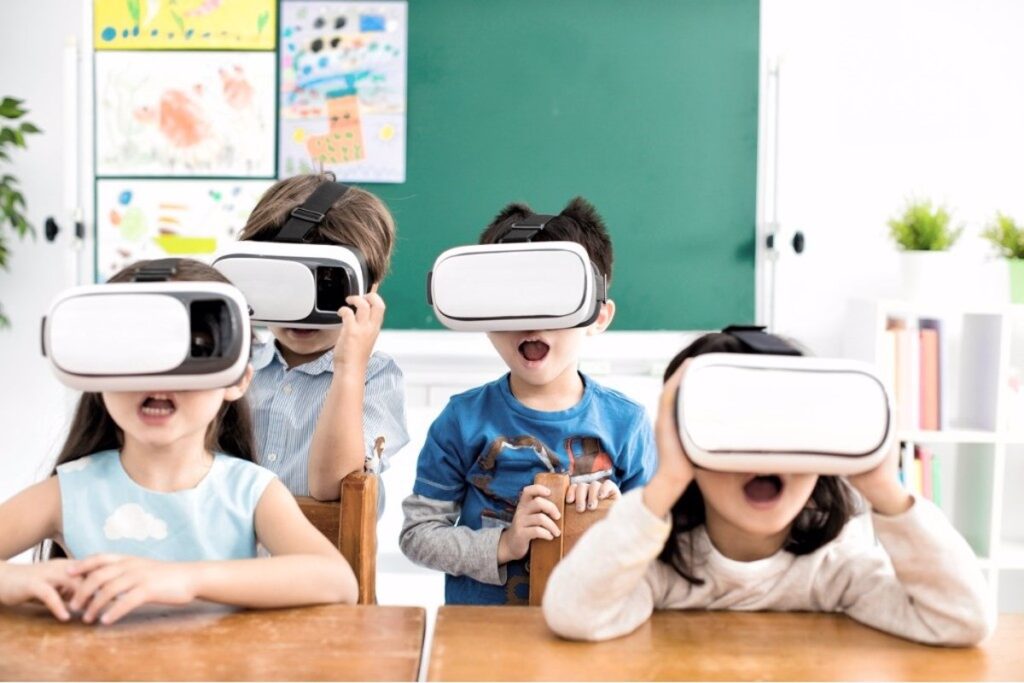Education is the only effective mechanism to transform reality and achieve inclusive and sustainable societies; fairer and more equal. It is necessary to bet on research, science and the transfer of knowledge, but we must also educate in the development of skills for change, and in the social and human dimension of each student. For this, innovative educational models are essential to prepare them to face uncertainty and project themselves in a complex and constantly evolving society.
The speed required to respond to the new challenges that arise in the education sector forces institutions to be better informed about trends in order to anticipate changes and stay one step ahead.
In this case, current students will be the professionals and leaders of the future who will have to solve challenges for which there is no precedent. The digital transformation of many sectors, the disruption of many others, and climatic, social and demographic changes, require new ways of thinking and acting, which are not always part of the goals of traditional education.

Educational innovation
The way of teaching at school has changed a lot in recent years due to the introduction of new technologies, but the way in which students are educated has also changed since it is no longer a group of passive students who listen to a teacher and who is the only active person, but of joint learning in which all people are active.
Educational innovation is a process that implies a change in teaching and is based on four fundamental elements: people, knowledge, processes and technology. If the four elements are not considered together, it is likely that educational innovation will not have the expected success.
You know very well that innovating in education is not an easy task, and it is a challenge to overcome institutional or socio-cultural obstacles associated with the process of transformative change. For this reason and to achieve educational success in this sense, it will be necessary: the formulation and practical implementation of specific public policies to guide innovative action at the educational center level. The financial contributions that are required to cover the costs of all educational innovation, for example, in the provision of equipment, acquisition of teaching materials, teacher training, advice for curricular redesign and maintenance of centers, among others.
As well; It is desirable to have a leader committed to change, who encourages the educational community to get involved in the innovation process through teamwork, who fosters a positive organizational climate and promotes a system of continuous evaluation of the process that allows feedback changes and make timely decisions. In the same way, it will be necessary to have teaching staff aware of the objectives of the innovation process, which promotes the autonomy and responsibility of the student in their learning.

Trends in educational innovation
Today, educational innovation is the engine of change in education, committed and empowered teachers regarding leadership and innovation skills are the ones that make the difference.
I detail in this article what are the main trends in educational innovation:
Gamification: Today many children learn by playing. Gamification consists of using games to teach and enhance the motivation of students. This makes learning a positive and motivating experience. You can, for example, set challenges for children, with prizes or scores to achieve a reward. Video games can also be used for educational purposes.
Reverse pedagogy or Flipped Classroom: One of the most important factors in educational innovation is changing the roles of teachers and students so that the latter actively participate in their own learning process. On the one hand, some exercises that were previously done in class can be done at home with audiovisual support and, on the other hand, challenges can be set in class that students must work on in groups or individually to learn.
Mindfulness and Emotional Education: Teamwork, assertive communication, and decision-making are some of the traits expected of tomorrow's leaders. Mindfulness can help connect with emotions and from there trigger creativity.
Creative talent is not only a skill to develop, but also facilitates collaborative work, empowering teams and improving links. Students feel comfortable in work teams and tend to be more empathic and thus more predisposed to think of innovative solutions.
Virtual reality and augmented reality: The use of new technologies is also another element of educational innovation, and virtual and augmented reality can be excellent tools for, for example, teaching history or geography to students.
Learning by projects: Currently, many companies work by projects, that is, work teams are formed and projects are developed with a specific purpose. In the classroom you can work in a similar way both in groups and individually. For example, the teacher proposes a series of tasks to solve a problem or asks the students several questions and they must investigate by themselves to later present the project to the class.
Teacher training: Any professional, regardless of the area in which they work, must be recycled and learn. The same thing happens with teachers, their continuous training is essential for educational innovation.
It is a fact that; innovating in education is building citizenship, training is key to obtaining better jobs, developing entrepreneurship and improving individual quality of life. The training of citizens with socio-emotional intelligence and empathy for their environment is key. It is not just about preparing students for the jobs of the future, but so that they can build the society in which they want to live. A positive school climate and harmonious coexistence are also essential for educational innovation.
Path to the knowledge society
As we have pointed out before, the world is migrating from an industrial society to a knowledge society; however, in this new scenario, advances in education and research will have an important contribution to solve the problems that affect the population, and therefore society as a whole.
COVID-19 has highlighted the fundamental importance of research, innovation and development, to face current and future challenges as a society; but, above all, it has highlighted the role of innovation in adapting to a changing world.
In this line, human capital is an important aspect for a knowledge society, and therefore for economic development; because it affects development directly, for example by increasing labor productivity, and indirectly by fostering innovation.
Therefore, the new knowledge society needs innovative and enterprising individuals, and in this case, teachers have the future in their hands.

How to train innovative individuals?
These are part of the challenges of the knowledge society; However, how innovative are our educational systems? I think there is not much to think about; so that our educational system maintains a product approach, where all students are given the same content and are expected to achieve the same skills, regardless of the diversity of vocations and ways of learning.
Current traditional education systems fail to train those innovative individuals that the knowledge society needs. In this way, it is essential to promote innovation in the educational area because it plays a crucial role in creating a sustainable future.
Many times we perceive education as a sector that is resistant to change; and, if changes occur, they are slow to implement. However, as I explained earlier, the educational sector is an important piece if we want to promote the development, economic growth and well-being of a country.
Because it is only possible to innovate by innovating.
Innovating implies a radical transformation of the educational model. It is necessary to unlearn the model centered on information, memorization and verticality, and build models centered on active methodologies, learning to learn, self-regulation of learning and collaborative and cooperative work.
In conclusion; The implementation of innovation in education constitutes an important element to promote education, which will allow us to have innovative and enterprising individuals to face the challenges of the knowledge society.
DO YOU WANT TO LEAVE YOUR COMMENT ON THIS ARTICLE? HERE YOU CAN DO IT
